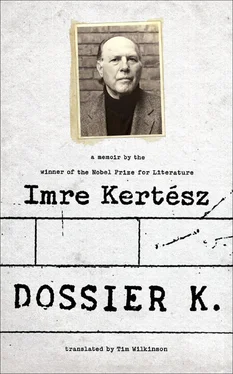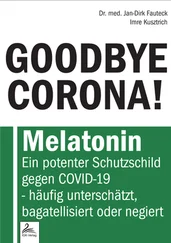Exactly so.
How many of these plays did you write with your friend Kállai?
Four or five, I don’t rightly recall.
After which you switched to translating .
But that was only possible after Fatelessness had been published.
So there was something for which you had Fatelessness to thank … Did its rejection by the first publisher you approached surprise you?
In point of fact, yes, but then again, not. It was somehow all of a piece with the things that usually happened to me.
Did it never occur to you that the assessment of those “experts,” let’s call them that, might have been right in some measure?
Nothing of the sort entered my head for a moment. It was quite obvious that the letter from the publisher was baloney and the entire drift of the invective was to serve up a pretext for rejection of the manuscript.
So what did you do with the returned manuscript?
“For the time being” I put it in the filing cabinet.
You resigned yourself to the fact that the book was not going to be published?
I don’t remember it coming to that.
All the same, what did you think or feel?
Boundless disgust and self-reproach at having deserved the fate.
I read somewhere that James Joyce was able to boast of having received more than a hundred letters of rejection. For his Swann’s Way, the first volume of In Search of Lost Time, Proust was rejected by an editor by the name of André Gide at Gallimard …
Those are not truly comparable instances. Joyce and Proust had to deal with the incomprehension and intellectual slothfulness that are customary with publishers. Those sorts of barriers one can understand and overcome. I, on the other hand, was rejected by the competent police body of a totalitarian regime, a censorship office disguised as a publisher that was run by an ex-officer of the military secret police. In my case it had long ceased being a matter of my book as such; it was a matter of a direct challenge to the Authority, of which cognizance is cursorily taken, while the perpetrator is simply swept aside as a roadblock with a devastating flip of the odious authority’s hand.
This is not just the way you were made to see it by the “dictatorship schizophrenia” to which you have already referred?
I don’t think so.
Nevertheless, in the end another publishing house did take you on and publish the book .
Not just another but the only other publishing house. There were no others at that time, and anyway, that second publishing house could just as easily have rejected it as the first.
True .
There would have been no further options.
That’s also true. Let’s cast anchor in this extraordinary situation: one of the publishing houses has rejected your book but the other does not respond. What would have happened if the response from them were likewise negative? Would you have abandoned writing novels?
I don’t think the question would ever have arisen in that form. At worst, I wouldn’t have bothered searching any more for a publisher for my manuscript.
Let me go back to a remark you made just before about the possibility of your book being seen as a direct challenge to the Authority. Do you mean in regard to its “subject” as such, the Holocaust, or the way in which you handle it in Fatelessness?
The sheer impudence that the book denoted through its mere existence, its style, its independence; a sarcasm inherent in its language that strains permitted bounds and dismisses the craven submissiveness that all dictatorships ordain for recognition and art.
Going through that early “intermission” period in Galley Boat-Log, I come across an outline of another important recognition you reached: “I am bringing up ‘this subject,’ so I am told, too late, it is no longer of topical interest. ‘This subject’ should have been dealt with much earlier, at least ten years ago, etc. Yet these days I have again had to realize that the Auschwitz myth is the only thing which truly interests me … Whatever I think about, I am always thinking about Auschwitz. Even if I may seem to be talking about something quite different, I am still talking about Auschwitz. I am a medium for the spirit of Auschwitz, Auschwitz speaks through me. Everything else strikes me as inane by comparison … Auschwitz and everything bound up with it (but then what does not have something to do with it?) is the greatest trauma for the people of Europe since the Crucifixion …” 36 Do you still see it the same way now, several decades later and after the change of regime in Hungary?
With appropriate changes, yes.
What’s changed?
Everything — the world, politics, you, me …
Let’s just see how much. Would you still mention Auschwitz and the Crucifixion in the same sentence today?
More than ever, because it is precisely in that context that Auschwitz’s baleful significance is revealed for those who have grown up in Europe’s ethical culture. One of the laws enshrined in the Ten Commandments of that culture is “Thou shall not kill.” So in other words if mass murder can become common practice, a day-to-day routine so to say, then one needs to decide the validity of the culture for which an illusory value system has taught every single one of us in Europe, from primary school onward, to be murderers and victims alike.
That’s a dreadful vision: million of schoolchildren, satchels on their backs, trudging to school only to be reunited again as perpetrators and victims in the anterooms of the crematoria and by the ditches dug as mass graves … Is that what we have come to? Is that what this conversation is about?
It looks as though if we start to talk about culture and the European scale of values, we soon get round to the question of murder.
In one of your earlier essays you come to this conclusion: “The Holocaust, in essence, is not a historical event any more than, let’s say, the idea that the Lord handed over to Moses on Mount Sinai a tablet of stone carved full of letters is a historical event.”
Maybe I ought to have phrased it rather as “the Holocaust is not a purely historical event.” The very fact that it is a historical event carries its own extraordinary importance, of course, just as the fact that it cannot be degraded to a purely historical event.
“The question,” you write, “should run ‘Can the Holocaust create any value?’” And before going on to sketch out a clear outline of the question, you make it understood well in advance: “If we examine whether the Holocaust is one of the vital issues of European civilization, of European consciousness, we shall find that indeed it is, because that same civilization must reflect on its being the one within whose framework that was carried out, otherwise it will itself become a casualty civilization, a crippled primitive being that is carried helplessly toward extinction.” That was the essay about Jean Améry that you wrote in 1992 under the title “The Holocaust as Culture.” 37
I would write exactly the same today.
Do you mean to say that the question has still not been settled?
No, not at all — quite the contrary. It would be political blindness if one were to fail to notice at every hand the positive signs of this determination that has been reached in the consensus between the states of Europe.
I still get the feeling that you are holding back on something .
Look, one might add the remark that although an Auschwitz was indeed possible, the only response to that unique crime, a catharsis, has not been possible. That has been made impossible by reality, our mundane reality, the way in which we live our lives — or in other words, which made Auschwitz possible in the first place.
Читать дальше












